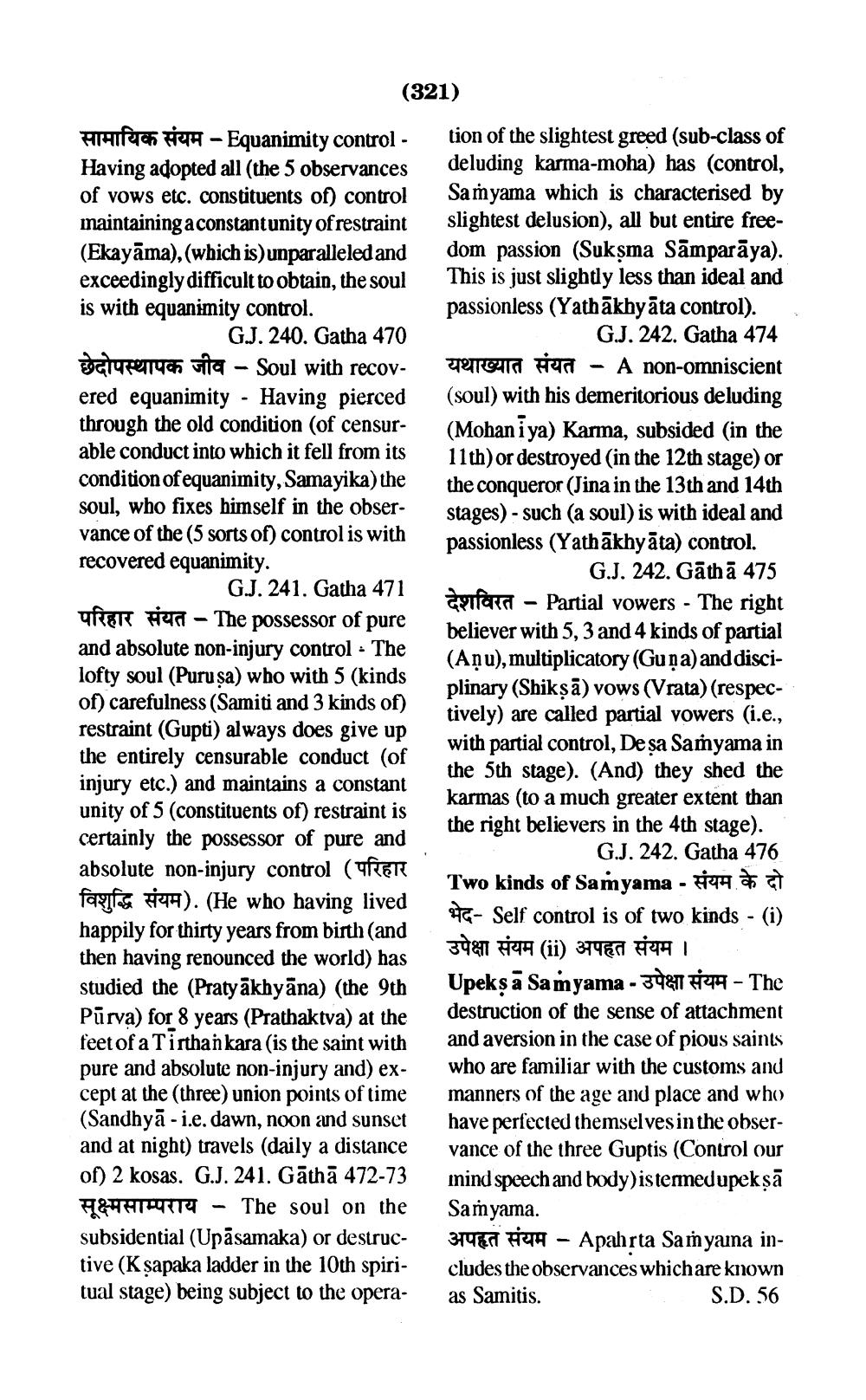________________
(321) Arhiva vie - Equanimity control - tion of the slightest greed (sub-class of Having adopted all (the 5 observances deluding karma-moha) has (control, of vows etc. constituents of) control Samyama which is characterised by maintaining a constantunity of restraint slightest delusion), all but entire free(Ekayāma), (which is)unparalleled and dom passion (Suksma Sāmparāya). exceedingly difficult to obtain the soul This is just slightly less than ideal and is with equanimity control.
passionless (Yathākhyāta control). G.J. 240. Gatha 470
G.J. 242. Gatha 474 SG141 14 Fita - Soul with recov- en fien - A non-omniscient ered equanimity - Having pierced (soul) with his demeritorious deluding through the old condition (of censur- (Mohan iya) Karma, subsided in the able conduct into which it fell from its
11th) or destroyed (in the 12th stage) or condition of equanimity, Samayika) the
the conqueror (Jina in the 13th and 14th soul, who fixes himself in the obser
stages) - such (a soul) is with ideal and vance of the (5 sorts of) control is with
passionless (Yathākhyāta) control. recovered equanimity.
G.J. 242. Gāthā 475 G.J. 241. Gatha 471
anfaat - Partial vowers - The right परिहार संयत - The possessor of pure
believer with 5, 3 and 4 kinds of partial and absolute non-injury control - The
(Aņu), multiplicatory (Guņa) and discilofty soul (Purusa) who with 5 (kinds
plinary (Shikṣā) vows (Vrata) (respecof) carefulness (Samiti and 3 kinds of)
tively) are called partial vowers (i.e., restraint (Gupti) always does give up
with partial control, Desa Samyama in the entirely censurable conduct (of
the 5th stage). (And) they shed the injury etc.) and maintains a constant
karmas (to a much greater extent than unity of 5 (constituents of) restraint is
the right believers in the 4th stage). certainly the possessor of pure and
G.J. 242. Gatha 476 absolute non-injury control (HTER
Two kinds of Samyama - संयम के दो fazifas 14h). (He who having lived
- Self control is of two kinds - (i) happily for thirty years from birth (and then having renounced the world) has
उपेक्षा संयम (ii) अपहत संयम । studied the (Pratyākhyāna) (the 9th Upekşā Samyama - 394144 - The Pūrva) for 8 years (Prathaktva) at the destruction of the sense of attachment feet of a Tirthan kara (is the saint with and aversion in the case of pious saints pure and absolute non-injury and) ex- who are familiar with the customs and cept at the (three) union points of time manners of the age and place and who (Sandhyā - i.e. dawn, noon and sunset have perfected themselves in the obserand at night) travels (daily a distance vance of the three Guptis (Control our of) 2 kosas. G.J. 241. Gāthā 472-73 mind speech and body)isteredupeksā A& TORTA - The soul on the Samyama. subsidential (Upāsamaka) or destruc- 314€ RA - Apahrta Samyaina intive (K sapaka ladder in the 10th spiri- cludes the observances which are known tual stage) being subject to the opera as Samitis.
S.D. 56




